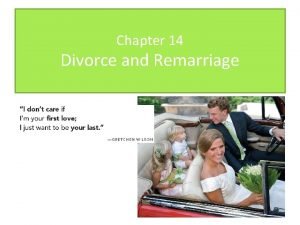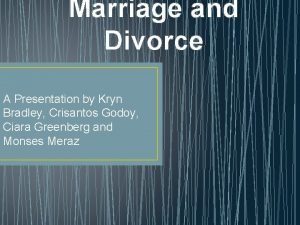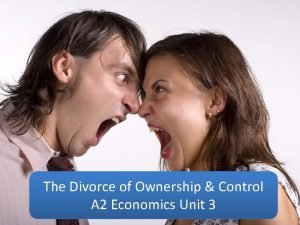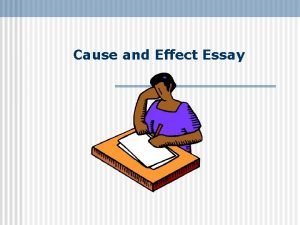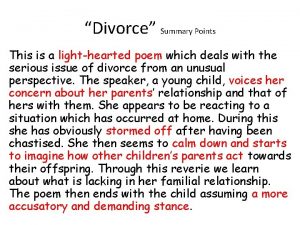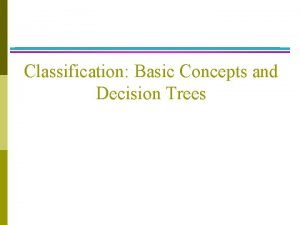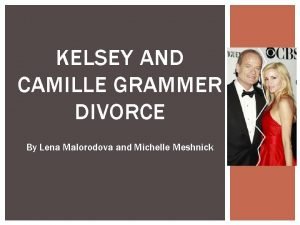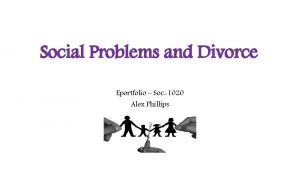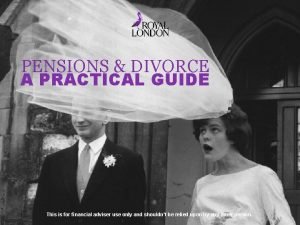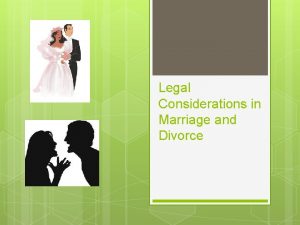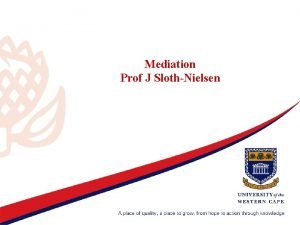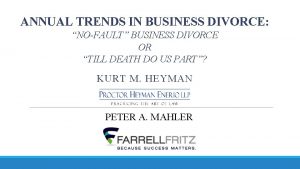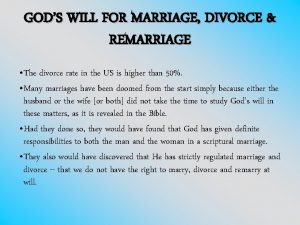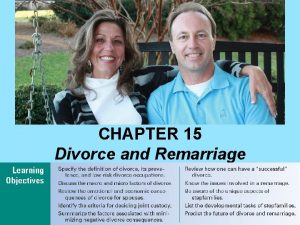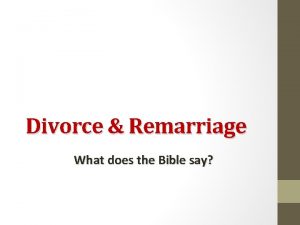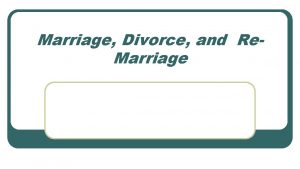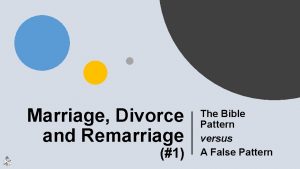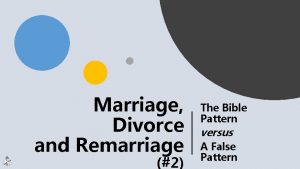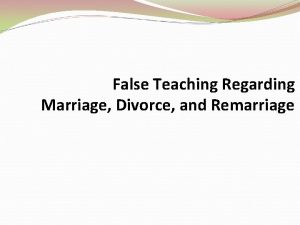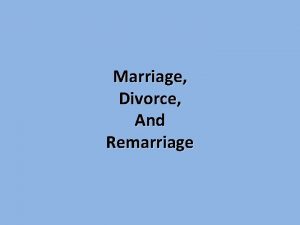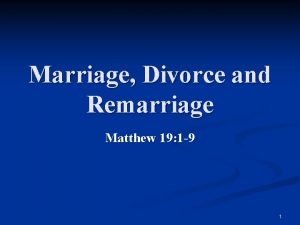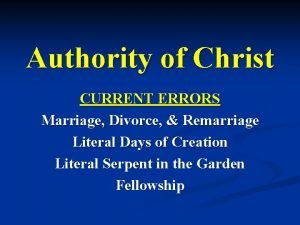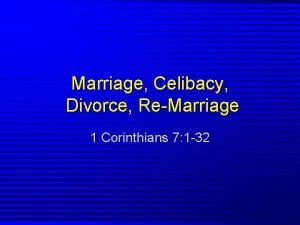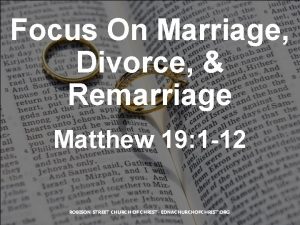H E Phillips The marriage divorce and remarriage



























































- Slides: 59


H. E. Phillips “The marriage, divorce and remarriage issue will probably never be resolved for all. It is not because the Word of God is not clear on the matter, nor does the real issue hang upon the definition of some words used in the Bible. The issue is difficult to resolve because of human involvement and situations with emotional overtones that cry out for some favorable answer from the Word of God to justify that human element. Many doctrines reign from the same “background””

The Word of God Must Be Our Standard § 1 Peter 4: 11 – “speak as the oracles of God” §Col. 3: 17 “do all in the name of the Lord” §Rev. 10: 9 – God’s word can be bitter and hard to swallow

Can the Guilty Party Remarry Without Sin? MATTHEW 19: 9

1) The Position Defined Can the Guilty Party Remarry Without Sin?

The Positio n Define d Focus of the Position is the Guilty Party Guilty – One Guilty of Sin of Adultery Innocent – The party not guilty of adultery

Divorces Cause: He is Guilty of Adultery Argued: • When a Divorce Is for Fornication – Both the Innocent and the Guilty are Free to Remarry Without Sin M a r r I e s Not Sinful

Not All Advocates Of This Position Arrive At This Conclusion The Same Way One Free-Both Free Exception Phrase Modifies Both the One Who Puts Away and the Put Away All Unmarried People have Right to Marry Fornication Severs Marriage So No Longer Married – Can’t Commit Adultery is Act of Remarriage Not Continued Relationship

We Are Not Discussing: Whether the Put Away Fornicator Can Reconcile to Their Mate The Rights of the Put Away After Their Mate Dies

1) The Position Defined Can the Guilty Party Remarry Without Sin? 2) Basic or Foundational Principles

Basic or Foundational Principles Ø The Difference in the Marriage and the Bond

Confusion Over Marriage & The Bond Same Thing Marriage Bond Equate the two ü “If no longer married, then no longer bound” ü Contrast marriage/divorce “in the eyes of God” –vs- “in the eyes of men” Marriage / Divorce (God Approves) Marriage / Divorce (God Not Approves) “In the eyes of God” “Real” “In the eyes of man” “Not Real”

Difference in Marriage and Bond 2 For the woman who has a Bound to 1 st Husband Married to Another Man husband is bound by the law to her husband as long as he lives. But if the husband dies, she is released from the law of her husband. 3 So then if, while her husband lives, she marries another man, she will be called an adulteress; but if her husband dies, she is free from that law, so that she is no adulteress, though she has married another man.

Married To One & Bound To Another 2 For the woman which hath an husband is bound by the law to [her] husband so long as he liveth; but if the husband be dead, she is loosed from the law of [her] husband. 3 So then if, while [her] husband liveth, she be married to another man, she shall be called an adulteress: but if her husband be dead, she is free from that law; so that she is no adulteress, though she be married to another man. Bound To 1 st husband Not Married To Bound Another Man

God’s Law: TO Married Bound By TO Bound By Obligates and Restrains – Romans 7: 2; 1 Cor. 7: 39

The Marriage and the Bond Marriage is a relationship enters into by agreement and by compliance with civil law Bond – covenant with God that joins one to his mate (Matthew 19: 6).

Basic or Foundational Principles Ø The Difference in the Marriage and the Bond Ø We Must Have Authority for All That We Do

o Colossians 3: 17 o 2 John 9 We Must Have Authority for All That We Do o Silence does not establish authority Silence is prohibitive not permissive - Hebrews 7: 14 o Authority is Established by: (Acts 15) o Direct Command o Approved Example o Necessary Inference or Conclusion

Those who have never been married – 1 Cor. 7: 2, 27 -28 WHO HAS THE AUTHORIT Y TO MARRY? Those whose mate has died - Romans 7: 2 -3 Those reconciling - 1 Cor. 7: 11 One who put away their mate fornication Matthew 19: 9 THERE IS NO AUTHORITY FOR THE PUT AWAY FORNICATOR TO REMARRY

Basic or Foundational Principles Ø The Difference in the Marriage and the Bond Ø We Must Have Authority for All That We Do Ø The Bible Forbids the Put Away One from Remarrying

Matt. 19: 9 And I say unto you, Whosoever shall put away his wife, except it be fornication, and shall marry another, committeth adultery: and whoso marrieth her which is put away doth commit adultery.

Matt. 19: 9 A And I say unto you, Whosoever shall put away his wife, except it be fornication, and shall marry another, committeth adultery: B and whoso marrieth her which is put away doth commit adultery.

Matt. 19: 9 A B Put Away (for forn. ) - Remarry - No Adultery Put Away (no forn. ) - Remarry - Adultery Is Put Away - Remarry - Adultery

Authenticit y of Matthew 19: 9 b § Some translations do not contain Part B of Matthew 19: 9 § NASB- “And I say to you, whoever divorces his wife, except for immorality, and marries another woman commits adultery. ” § ESV – “And I say to you: whoever divorces his wife, except for sexual immorality, and marries another, commits adultery. ” § It is Found in the Majority of Manuscripts § Bruce Metzger was asked by Donnie Rader - “Is there any textual evidence to reject the phrase ‘and whoso marrieth her which is put away doth commit adultery’? ” - His answer was "No” § Pulpit commentary - “It has very

Authenticit y of Matthew 19: 9 b § Even If It Could Be Proven That Matthew 19: 9 b was not part of the original text – There is no doubt as to the authenticity of the statement § Matthew 5: 32 § Luke 16: 18

1) The Position Defined Can the Guilty Party Remarry Without Sin? 2) Basic or Foundational Principles 3) Arguments Used to Defend The Guilty Party Remarrying

Arguments Used to Defend The Guilty Party Remarrying • One Free- Both Free

One Free – Both Free • Comparison is often made to being “handcuffed” 0 r “tied with a rope” to another person.

"Tie your two hands together and let each hand represent one of the two parties to a marriage. Cut the string. Which hand is freed? Both!" (Roland H. Worth, Jr. , Divorce And Remarriage, p. 11) One Free – Both Free

One Free – Both Free • We Need to Be Careful Trying to Establish Truth by Illustration • An Illustration is Used to Clarify a Truth Already Established from Scriptures • Assumes that the man and his wife are the only two involved in the bond. In this view marriage is viewed as a two-way contract.

God’s Law Jill Jac k

Arguments Used to Defend The Guilty Party Remarrying • One Free- Both Free • 1 Corinthians 7: 2, 27 -28 - Authorizes Them to Remarry

1 Corinthians 7: 2, 27 -28 - Authorizes Them to Remarry § 1 Corinthians 7: 2 § Paul was dealing with questions that had been sent to him by the Corinthians - 1 Corinthians 7: 2 § Paul is showing that celibacy is not a more righteous state than marriage. § The passage is addressing the “Never before ` married” not the put away fornicator

1 Corinthians 7: 2, 27 -28 - Authorizes Them to Remarry § 1 Corinthians 7: 27 -28 – ““If you marry, you have not sinned” § The context of this passage is discussing “virgins” (those never married) - 1 Cor. 7: 25 § H. A. W. Meyer - “ does not imply: art thou separated from. . , but art thou free from, untangled with a wife, single” § Gordon Fee - “It lies totally outside the present context to suggest that the two questions address the married and the divorced” - The 1 st Epistle to the Corinthians, pg. 331

1 Corinthians 7: 2, 27 -28 - Authorizes Them to Remarry § Paul has already made it clear that not all “unmarried” people can marry - 1 Corinthians 7: 10 -11

Unscriptural Divorce Leaves One Unmarried 10 ¶ Now to the married I command, yet not I but the Lord: A wife is not to depart from her husband. 11 But even if she does depart, let her remain unmarried or be reconciled to her husband. And a husband is not to divorce his wife. Unscript. Divorce NOT Unscript. Divorce Remain UNmarried Remain Married

Arguments Used to Defend The Guilty Party Remarrying • One Free- Both Free • 1 Corinthians 7: 2, 27 -28 - Authorizes Them to Remarry • Exception Phrase in Matthew 19: 9 Modifies Both Clauses

They Have Matthew 19: 9 Saying: “And I say unto you, Whosoever shall put away his wife, except it be fornication, and shall marry another, committeth adultery: and whoso marrieth her which is put away, except it be fornication, doth commit adultery. ”

Hugo Mc. Cord “They know that in no Greek manuscript does the exceptive phrase appear in the second clause, and that without its being there, their cause is lost. Therefore they say the phrase must be inferred in the second clause. ” - Spiritual Sword Lectureship, 1979

Matt. 19: 9 – Two Independent Clauses A And I say unto you, Whosoever shall put away his wife, except it be fornication, and shall marry another, committeth adultery: B and whoso marrieth her which is put away doth commit adultery.

The Exception Phrase Cannot Modify the Second Phrase “In Matthew 19: 9 the original Greek text translated ‘except fornication’ modifies the ‘putting away’ on the part of the man and does not modify the person who is put away. ” Leonard Latkovski, Professor of Classic Languages,

The Exception Phrase Cannot Modify the Second Phrase “In my opinion, the phrase ‘except it be fornication. ’ applies to the first clause but not to the second” Dr. Harry Sturz, Greek Department, Biola College

The Exception Phrase Cannot Modify the Second Phrase “The modifying clause (except it be fornication) applies only to the first person mentioned, in the first half of the sentence. It does not apply, grammatically, or syntactically, to the person (‘whoso marrieth her who is put away’) in the second half of the sentence. ” - Donald Drury M. A. , English Department, Long Beach City College

Arguments Used to Defend The Guilty Party Remarrying • One Free- Both Free • 1 Corinthians 7: 2, 27 -28 - Authorizes Them to Remarry • Exception Phrase in Matthew 19: 9 Modifies Both Clauses • Matthew 19: 9 b Is Not Talking About Put Away Fornicator

“The only noun in this sentence to which ‘her’ and ‘she’ can refer is ‘wife’…. . Grammarians say it is one and the same woman in BOTH CASES! Jesus stated the consequences of a man putting away his wife WITHOUT fornication and marrying another. He then followed-through showing the results of marrying THAT put away woman” - Melear-Williams Debate

“Actually, however, the omission of the definite Greek article from the second clause forbids grammatically (besides the contradiction) carrying over the exceptive phrase to the second clause. This is true because the second clause in omitting the definite article cannot refer to any specific woman, but to any put-away woman. A marriage with any put-away woman, Jesus asserted, is adultery. To make Jesus say that he was only eliminating non-adulterous wives from remarriage, not adulterous ones, is slander against the beauty of the Lord's teaching. The AV and the ASV both are faithful to the text in omitting the article from the second clause. The RSV and the NASV are clear, setting forth precisely what the Lord said. . . But the NEB ("a woman thus divorced") and the NIV ("a woman so divorced") bring the exceptive phrase of the first clause into the second, and so do not faithfully translate Jesus' words. ” Spiritual Swords Lectureship, 1979

Matthew 19: 9 b Is Not Talking About Put Away Fornicator • Even if Matthew 19: 9 b did not include the put away fornicator (and it does) there is still no authority for put away fornicator to remarry. • We Still Have Matthew 5: 32 that says, “whoever marries a woman who is divorced commits adultery. ”

Arguments Used to Defend The Guilty Party Remarrying • One Free- Both Free • 1 Corinthians 7: 2, 27 -28 - Authorizes Them Remarry to • Exception Phrase in Matthew 19: 9 Modifies Both Clauses • Matthew 19: 9 b Is Not Talking About Put Away Fornicator • Adultery Can Only Be Committed by Married People So If They Are Unmarried They Can’t Be

Adultery Can Only Be Committed by Married People So If They Are Unmarried They Can’t Be Guilty of Adultery § This fails to appreciate the difference in the marriage and the bond - Romans 7: 2 -3. § It is adultery because she is “bound by the law” to her first husband even though she is married to another man. § Not All Unmarried People Have Right to Marry Another – 1 Corinthians 7: 11

Arguments Used to Defend The Guilty Party Remarrying • Fornication Severs the Marriage When Committed. When the Marriage is Severed They (The innocent and the guilt) Are No Longer Married to One Another and both are free to remarry.

Lloyd Moyer “ The marriage ceases to be that which God ordained when one of the two parties of the marriage joins his body to that of someone other than the person to whom he is married" …… "When a marriage is thus dissolved, the innocent is no longer married to the guilty, nor is the guilty any longer married to the innocent. No marriage exists. Where no marriage exists, the parties may marry someone else" (Frost-Moyer Exchange)

Fornication Severs the Marriage Ø There is a clear distinction made between “fornication” and “divorce” in Matthew 19: 9. Fornication is the cause not the putting away itself. Ø If this is the case then one could be unmarried and not know it. Ø If a husband was guilty of adultery and that ended the marriage then would the wife be guilty of fornication next time she had sexual relations with him. If not, why not?

Arguments Used to Defend The Guilty Party Remarrying • Fornication Severs the Marriage When Committed. When the Marriage is Severed They (The innocent and the guilt) Are No Longer Married to One Another and both are free to remarry. • Adultery is Only the Act of Remarrying Not the Continued

Olan Hicks “This establishes, if we take precisely what the scriptures say, omitting human opinion entirely, that the 'adultery' which is to be repented of in this case, consists of two actions, 'putting away' and 'marrying another'

Adultery is Only the Act of Remarrying Not the Continued ØIn this view adultery is a one time act that can be repented of and then you can continue to live with that mate. Ø This is not the way that adultery is used in the scripture (John 8: 1 -11; Matthew 5: 28).

1) The Position Defined Can the Guilty Party Remarry Without Sin? 2) Basic or Foundational Principles 3) Arguments Used to Defend The Guilty Party Remarrying 4) Consequences of This Position

Consequences Ø It Rewards Adultery Since God’s Judgment is Harder on the Unjustly Put Away Than the One Justly Put Away Ø No Such Thing As A Unscriptural Divorce Ø Guilty Party Remarrying and Mental Divorce Have Same Error as Basis

Can the Guilty Party Remarry Without Sin? MATTHEW 19: 9

 Psychic remarriage
Psychic remarriage Marriage and divorce presentation
Marriage and divorce presentation Divorce between ownership and control tutor2u
Divorce between ownership and control tutor2u Ownership
Ownership Expository cause and effect
Expository cause and effect In the kitchen monica ali
In the kitchen monica ali Law on adultery and divorce
Law on adultery and divorce Malachi 2 13-16
Malachi 2 13-16 Surah talaq ayat 7
Surah talaq ayat 7 Abe odd hull luck oak
Abe odd hull luck oak Functionalist perspective on divorce
Functionalist perspective on divorce Divorce by jackie kay
Divorce by jackie kay Divorce poem
Divorce poem Objectives of divorce
Objectives of divorce Objectives of divorce
Objectives of divorce Gini
Gini Divorce busters
Divorce busters Harris county divorce e-file
Harris county divorce e-file Arielle dombasle jeune
Arielle dombasle jeune Harmony divorce mediation
Harmony divorce mediation Foyer inn form hay shun
Foyer inn form hay shun Prepare after divorce
Prepare after divorce Did henry viii divorce catherine of aragon
Did henry viii divorce catherine of aragon Cody kelsey divorce
Cody kelsey divorce Conclusion of divorce
Conclusion of divorce Divorce in india
Divorce in india Reasons for divorce
Reasons for divorce Fraternal twins pedigree chart
Fraternal twins pedigree chart Mediation in certain divorce matters act
Mediation in certain divorce matters act Standout dare ii
Standout dare ii Nofault divorce
Nofault divorce Revelation song phillips craig and dean
Revelation song phillips craig and dean Hát kết hợp bộ gõ cơ thể
Hát kết hợp bộ gõ cơ thể Slidetodoc
Slidetodoc Bổ thể
Bổ thể Tỉ lệ cơ thể trẻ em
Tỉ lệ cơ thể trẻ em Chó sói
Chó sói Glasgow thang điểm
Glasgow thang điểm Bài hát chúa yêu trần thế alleluia
Bài hát chúa yêu trần thế alleluia Kể tên các môn thể thao
Kể tên các môn thể thao Thế nào là hệ số cao nhất
Thế nào là hệ số cao nhất Các châu lục và đại dương trên thế giới
Các châu lục và đại dương trên thế giới Công thức tính thế năng
Công thức tính thế năng Trời xanh đây là của chúng ta thể thơ
Trời xanh đây là của chúng ta thể thơ Mật thư tọa độ 5x5
Mật thư tọa độ 5x5 Phép trừ bù
Phép trừ bù độ dài liên kết
độ dài liên kết Các châu lục và đại dương trên thế giới
Các châu lục và đại dương trên thế giới Thể thơ truyền thống
Thể thơ truyền thống Quá trình desamine hóa có thể tạo ra
Quá trình desamine hóa có thể tạo ra Một số thể thơ truyền thống
Một số thể thơ truyền thống Cái miệng bé xinh thế chỉ nói điều hay thôi
Cái miệng bé xinh thế chỉ nói điều hay thôi Vẽ hình chiếu vuông góc của vật thể sau
Vẽ hình chiếu vuông góc của vật thể sau Thế nào là sự mỏi cơ
Thế nào là sự mỏi cơ đặc điểm cơ thể của người tối cổ
đặc điểm cơ thể của người tối cổ Ví dụ về giọng cùng tên
Ví dụ về giọng cùng tên Vẽ hình chiếu đứng bằng cạnh của vật thể
Vẽ hình chiếu đứng bằng cạnh của vật thể Fecboak
Fecboak Thẻ vin
Thẻ vin đại từ thay thế
đại từ thay thế
